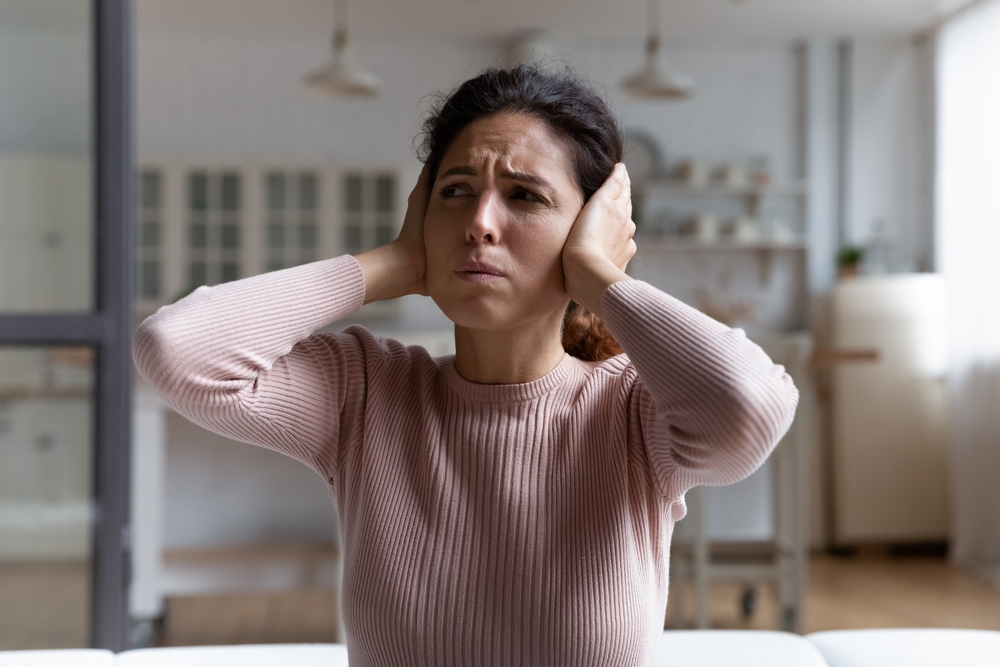If you’ve ever heard a strange, persistent sound in your ears—like white noise or the hum of wind—you’re not imagining it. While it’s common to feel confused about what’s happening, rest assured, this sensation is real. You may be experiencing tinnitus, a condition that causes phantom sounds that only you can hear.
In this article, we’ll explore what tinnitus is, why you might hear white noise in your ears, the causes behind it, and how to manage it effectively.
What is tinnitus and why do I hear white noise in my ears?
Tinnitus refers to the perception of sound in the ears when no external noise is present. Often described as a ringing, buzzing, or humming, it can also sound like wind or white noise. Tinnitus is commonly linked to hearing loss, though it can also occur in people with normal hearing. It’s often intermittent but can be constant, making it difficult to focus or sleep.
This phenomenon is frustrating for many, especially when trying to explain it to others. While some conditions, such as “phantom ring syndrome,” involve mistakenly thinking you hear your phone ringing, tinnitus is a real, ongoing experience.
The sound may seem like an overlay on everything you hear, but it is not a hallucination—it’s a legitimate condition that can affect your quality of life.
Why does tinnitus get worse in silence?
The severity of tinnitus can fluctuate, and one situation where it tends to intensify is during periods of silence, like at night. In a quiet environment, there are fewer competing sounds to mask the tinnitus, making the white noise seem more pronounced. This is especially noticeable when you’re alone with your thoughts, which amplifies the sensation of humming, buzzing, or ringing in your ears.
For many people, this experience is bothersome enough to interfere with sleep and relaxation. The quieter the surroundings, the more invasive the noise feels.
Is that “wind-like” sound really tinnitus?
Tinnitus varies widely from person to person, which can make it difficult to describe or compare. For some, the sound they hear may resemble TV static, buzzing, or even a dial tone. For others, it could be more like wind or whooshing. This variability means that the symptoms can differ, leading some to wonder if their symptoms truly align with tinnitus.
In some cases, you may be hearing pulsatile tinnitus, which is characterized by a rhythmic sound, often in sync with your heartbeat. This form of tinnitus is rarer but can be linked to specific health conditions, such as high blood pressure or vascular issues.
Common causes of tinnitus
The primary cause of tinnitus is often prolonged exposure to loud noises, which can damage the delicate hair cells in the inner ear. These hairs are responsible for translating sound waves into signals that your brain interprets. When they are damaged, the result is distorted or phantom sounds.
People who work in noisy environments, such as musicians, factory workers, or pilots, are at a higher risk for developing tinnitus due to ongoing exposure to loud sounds. Even seemingly harmless activities, like attending concerts or riding loud vehicles like motorcycles or snowmobiles, can lead to hearing damage over time.
Factors that make tinnitus worse
Certain lifestyle factors can worsen tinnitus, leading to more frequent or intense episodes. These include:
- Anxiety and Depression: These mental health conditions often exacerbate tinnitus symptoms, creating a vicious cycle.
- High Blood Pressure: Uncontrolled hypertension can restrict blood flow to the ears, worsening tinnitus.
- Smoking: Smoking harms circulation, which can make tinnitus more intense.
- Stress: High levels of stress can contribute to the severity of tinnitus, so finding healthy ways to manage it is crucial.
- Diet: Some people find that caffeine, alcohol, or certain artificial sweeteners can aggravate their symptoms.
Even factors like pregnancy and earwax buildup can cause or worsen tinnitus.
How to manage tinnitus: treatment options and strategies
Although tinnitus currently has no cure, there are various treatment options available to help manage symptoms and reduce the impact it has on daily life. Here are some strategies that may help:
- Sound Therapy: Utilizing white noise machines or other ambient sounds may help tune out the tinnitus, which can make it less noticeable, especially at night.
- Cognitive Behavioral Therapy (CBT): This therapeutic technique helps patients manage the emotional distress that often accompanies tinnitus. CBT helps retrain the brain to focus on positive thoughts, reducing anxiety.
- Hearing Aids with Tinnitus Masking: Modern hearing aids can be programmed to emit sounds that cancel out the specific tones associated with your tinnitus, providing relief.
- Meditation and Relaxation Techniques: Activities like yoga, deep breathing, and mindfulness meditation can reduce stress, which in turn may alleviate tinnitus symptoms.
- Medical Treatments: If your tinnitus is linked to an underlying condition such as high blood pressure or an ear infection, addressing these health issues can help reduce the tinnitus symptoms.
When to seek professional help
If you’re experiencing persistent or worsening tinnitus, it’s important to schedule an appointment with a specialist. They can perform diagnostic tests to determine the cause of your tinnitus and recommend appropriate treatments.
Consult with an expert in your area to discuss treatment options and improve your quality of life.



